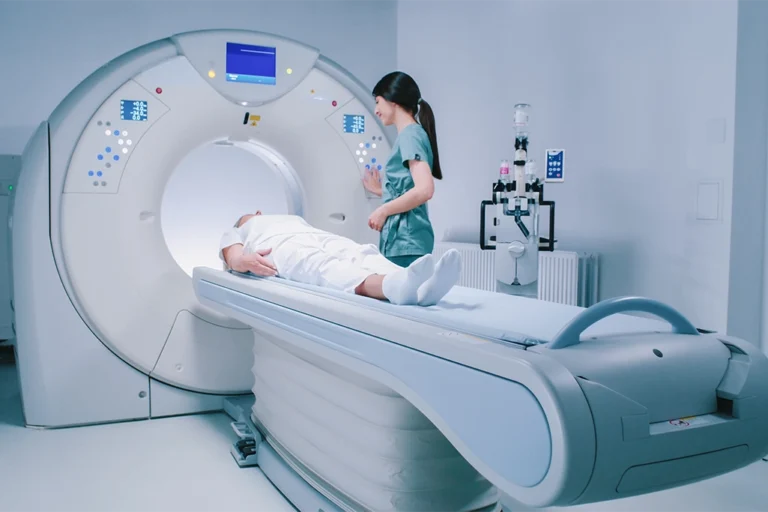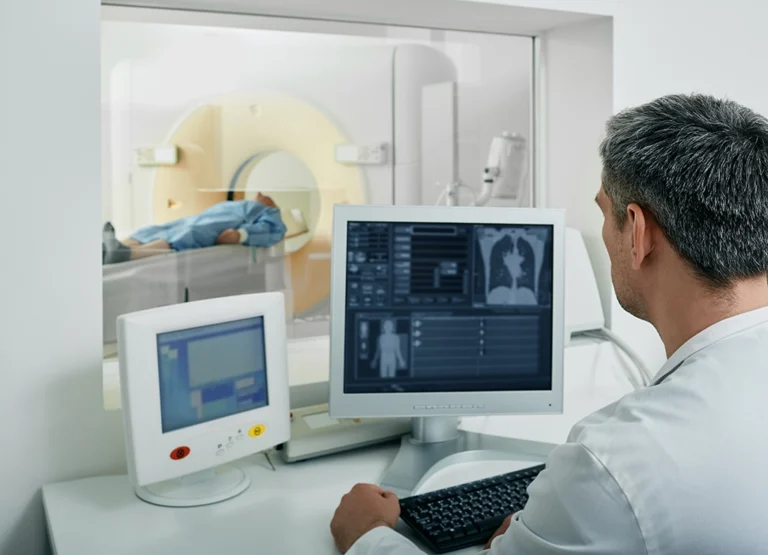A cardiac calcium scoring CT scan helps to measure your risk of heart attack. When a buildup of calcium happens in the arteries that send blood to your heart, it increases the chance of having a heart attack, since your heart cannot get the blood it needs to work as it should.
We’ll let you know exactly what a cardiac calcium scoring CT scan can reveal, as well as how to get ready for your appointment, what to expect during your CT scan, and what to expect after the scan. Let’s take a closer look at cardiac calcium scoring CT scans.
What a cardiac calcium scoring CT scan reveals
A cardiac calcium score is a measurement of how much calcium (also called plaque) is in these arteries. By understanding how much plaque we have, you can better know your risks, and take the needed steps to stay healthy. Let’s see what a cardiac calcium scoring CT scan can show.
What can a cardiac calcium scoring CT scan show?
Hardened fat and cholesterol mix with calcium and make the arteries narrower, which can sometimes lead to a complete blockage. A cardiac calcium scoring CT scan takes pictures of your heart, and provides measurements of how much calcium is in the arteries.
Your cardiac calcium score shows how much calcified plaque is present in your cardiac arteries, which helps make clear the risk of having coronary artery disease, and helps your provider to better treat your condition.
What is a cardiac calcium score? How does calcium scoring work?
Your cardiac calcium score is a number that reflects how much calcium is in your arteries. The numbers are in a range that tells how much risk is present.
A score of zero means you have no calcium buildup in the arteries, so the risk of heart attack is low. A score of 100 to 300 means your risk is somewhat higher. Scores above 300 mean a more serious risk of heart attack is present.
What can the results of a cardiac calcium scoring CT scan tell my healthcare provider?
The results of your cardiac calcium scoring CT scan tell your healthcare provider how high your risk of heart attack is. This information helps them work with you to plan appropriate interventions and treatments that match your risk level, and helps determine the best ways to reduce your risk of having a heart attack.
How to prepare for your cardiac calcium scoring CT scan
Your healthcare provider will give you personalized instructions for how to get ready for your cardiac calcium scoring CT scan, so be sure to follow their instructions, and contact them with any questions you may have. Here are a few things to keep in mind as you get ready for your scan.
How should I dress for my cardiac calcium scoring CT appointment?
You should wear loose comfortable clothing for your cardiac calcium scoring CT appointment. Avoid wearing any metal, such as jewelry, hearing aids, piercings, and eyeglasses, since anything metal could interfere with the accuracy of the scan. You may be asked to change into a gown before your scan begins.
Is it OK to eat and drink before a cardiac calcium scoring CT scan?
In most cases, you can eat and drink normally before your cardiac calcium scoring CT scan, but be sure to follow the instructions given by your healthcare provider. You may need to avoid caffeine and other stimulants, as these can raise your heart rate, which can affect the results of the scan.
Can I keep taking my medications before the scan?
It is generally safe to continue many medications as prescribed. However, some medications may affect your heart rate, or could otherwise influence scan results.
Be sure your healthcare provider knows what medications and supplements you are taking, and follow their advice on whether to continue them before the scan.
View our available cardiac calcium scoring studies at a location near you today
What should I expect during a cardiac calcium scoring CT scan?
Your cardiac calcium scoring CT scan is noninvasive and painless. You can expect to be in the scanner for about fifteen minutes. You may hear a whirring sound from the scanner as it takes the x-rays for the scan, and the scanner will rotate around your body, while you remain as still as possible.
What happens during a cardiac calcium scoring CT
During your cardiac calcium scoring CT you will follow the directions of your technologist, who will guide you through the scan. You will be asked to lie down on a bed-like table, and the table will slide into the donut-shaped scanner, which will take multiple images of your heart. Let’s take a closer look at what it’s like to get a cardiac calcium scoring CT scan.
How will the technologist position my body for this scan?
The technologist will have you lie down on your back on the table. They will support your head with a pillow, and may adjust the position of your arms and legs to allow for clearer images. Then your technologist will place the electrodes on your chest, to monitor your heartbeat during the scan.
Why do I need to wear electrodes for a cardiac calcium scoring CT scan?
The electrodes provide information about the timing of your heartbeat to the scanner. The images are taken between heartbeats, when your heart is relaxed. This gives the best pictures of your arteries, minimizes the likelihood of blurry images, and gives a more accurate calcium score. You won’t feel anything, at all, from the electrodes.
What to expect after your cardiac calcium scoring CT scan
After your cardiac calcium scoring CT scan you will likely have questions about your results, which you’ll be able to discuss with your healthcare provider. We’ll show you exactly what happens after a cardiac calcium scoring CT scan.
How will I get my CT results? How long will it take?
After your cardiac calcium CT scan, a radiologist will read the results and write a report, which will be shared with your healthcare provider.
Your provider will then contact you to discuss the results of your scan. Once you know the results, you’ll discuss the next steps with your healthcare provider.
When I get my results, what should I know about my cardiac calcium score?
Your cardiac calcium score reflects long-term plaque buildup, but it doesn’t show soft plaques or predict short-term heart attack risk on its own. Even with a 0 score, other risk factors like high cholesterol or inflammation can still contribute to heart disease.
A high score suggests significant arterial calcification, but the location and stability of the plaques matter more than just the total number. Advanced imaging tests, like coronary CT angiography, can provide a clearer picture of actual blockages.
What will my cardiac calcium score tell my healthcare provider about my care?
Your cardiac calcium score helps determine whether additional tests, like a stress test or coronary CT angiography, are needed to check for actual blockages. The score is considered along with other factors like blood pressure, cholesterol, and family history to create a personalized prevention plan.
Regardless of your score, lifestyle choices like diet, exercise, and stress management remain essential for your heart health.
How to schedule an appointment with us
Our goal is to offer you and your healthcare provider the most informative results possible, and we make it easy for you to get an appointment.
With numerous locations across South Jersey, you’ll find us conveniently located near major highways and key bridges in the region.
We’ll ensure the entire scheduling process is as effortless as possible for you. Above all, we are here to help you.
Reach out to us at any of the following locations to book an appointment:
- Haddonfield Office – Haddonfield, NJ
- Marlton (Greentree) Office – Marlton, NJ
- Medford Office – Medford, NJ
- Moorestown Office – Moorestown, NJ
- Mount Laurel Office – Mount Laurel, NJ
- Route 73 (Voorhees) Office – Voorhees Township, NJ
- Turnersville Office – Turnersville, NJ
- Voorhees Office – Voorhees Township, NJ
- Sewell (Washington Township) Office – Sewell, NJ
- West Deptford Office – West Deptford, NJ
- Willingboro Office – Willingboro, NJ
Learn more about the board-certified, subspecialized radiologists who read, analyze and interpret the findings here at South Jersey Radiology Associates.
Frequently Asked Questions
A cardiac calcium scoring CT scan shows the amount of calcium buildup in the coronary arteries, which can help assess the risk of heart disease.
The scan can identify early signs of coronary artery disease by detecting calcified plaque in the heart’s arteries.
A cardiac calcium score is a number that quantifies the amount of calcium in the coronary arteries, with higher scores indicating a greater likelihood of heart disease.
The results help your healthcare provider assess your risk for heart disease and determine the appropriate steps for prevention or treatment.
You should wear comfortable, loose-fitting clothing without metal zippers or buttons to avoid interference with the scan.
Yes, you can typically eat and drink before the scan, but follow any specific instructions from your healthcare provider.
The technologist will position you lying flat on your back on the CT scanner table, and may ask you to hold your breath for brief moments during the scan.
Your results will be sent to your healthcare provider, and it typically takes a few days to a week for them to contact you with the findings.



